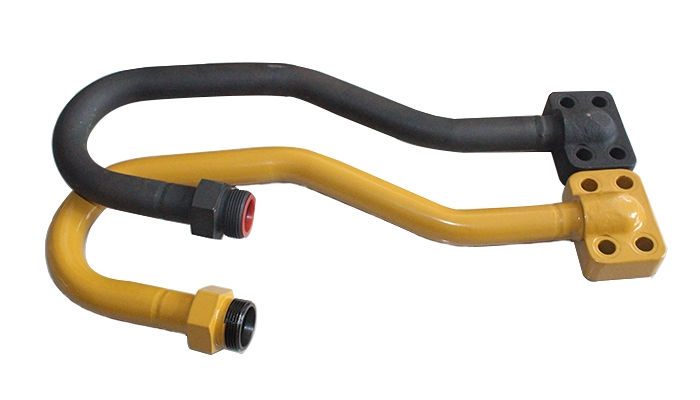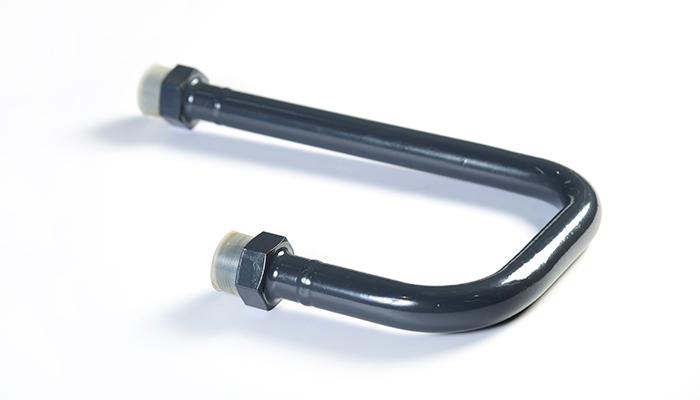Latest High Pressure Steel Pipe: Factory Direct Sale
-
2023-09-18
-
Xuzhou Global Precision Steel Tube Co., Ltd, a leading High Pressure steel pipe manufacturer, specializes in producing customized tube solutions for various industries, including automotive, engineering machinery, railway locomotive, ships, and hydraulic systems. Their commitment to quality and expertise ensures that their High Pressure Steel Pipe meets the stringent requirements of these demanding applications.
Latest High Pressure Steel Pipe: Introduction
A. Definition of High Pressure Steel Pipe
High Pressure Steel Pipe, often referred to as High Pressure tubing, are specialized tubes designed to withstand and transport fluids or gases under High Pressure conditions. These pipes are commonly used in various industries where the safe and efficient transmission of fluids or gases is paramount.
B. Importance of High Pressure Steel Pipe
High Pressure Steel Pipe plays a crucial role in numerous industrial applications. They are essential for ensuring the integrity and reliability of fluid and gas systems, particularly in environments where pressures exceed what standard pipes can handle. These pipes are relied upon to maintain safety, prevent leaks, and ensure efficient fluid or gas transfer.
C. Purpose of the Outline
The purpose of this outline is to explore the properties and types of High Pressure Steel Pipe. Understanding these aspects is vital for professionals and industries that rely on High Pressure fluid and gas systems. The information will help individuals make informed decisions when selecting the right type of High Pressure steel pipe for their specific needs.
Properties of HighPressure Steel Pipe
A. Material Composition
High Pressure steel pipe is typically manufactured using robust materials such as carbon steel, stainless steel, or alloy steel. These materials are chosen for their strength, durability, and resistance to corrosion, making them suitable for High Pressure applications.
B. Strength and Durability
One of the most critical properties of High Pressure Steel Pipe is its strength. They are engineered to withstand extreme pressures without deformation or rupture. This strength ensures the safety and longevity of the pipelines, reducing the risk of accidents and costly repairs.
C. Corrosion Resistance
High Pressure Steel Pipe is often exposed to harsh environmental conditions and corrosive substances. To combat corrosion, these pipes are coated with materials like galvanized zinc or phosphate, which provide an extra layer of protection against rust and corrosion.
D. Temperature Resistance
In addition to withstanding high pressures, these pipes are designed to handle a wide range of temperatures. They maintain their structural integrity even in extreme hot or cold conditions, making them versatile for various industries.
E. Pressure Rating
High Pressure Steel Pipe is categorized by their pressure rating, which indicates the maximum pressure they can safely handle. These pipes come in various pressure ratings to accommodate different industrial needs, ensuring safety and efficiency.
Types of High Pressure Steel Pipe
A. Galvanized Tube
Galvanized High Pressure Steel Pipe have a layer of zinc coating on the surface. This coating provides excellent corrosion resistance, making it suitable for outdoor and corrosive environments. Galvanized pipes are commonly used in water supply and construction applications.
B. Phosphate Tube
Phosphate High Pressure Steel Pipe is treated with a phosphate coating to enhance their corrosion resistance and improve lubricity. These pipes are often used in hydraulic and pneumatic systems, where smooth fluid flow is essential.
C. Bright Precision Steel Tube
Bright precision steel tubes are known for their high dimensional accuracy and smooth surface finish. They are widely used in automotive and engineering machinery, where precision is critical to performance.
D. Passivated Tube
Passivated High Pressure Steel Pipe undergoes a chemical treatment to remove impurities and improve their corrosion resistance. They are commonly used in the pharmaceutical and food processing industries, where cleanliness and purity are essential.
Latest High Pressure Steel Pipe: Manufacturing Process
A. Steel Selection
The journey of a High Pressure steel pipe begins with the selection of the appropriate steel material. Manufacturers like Xuzhou Global Precision Steel Tube Co., Ltd, carefully choose high-quality steel alloys. Commonly used materials include carbon steel, alloy steel, and stainless steel, each tailored to specific applications. The steel’s composition plays a pivotal role in determining the pipe’s strength and corrosion resistance.

B. Pipe Forming
Once the steel is selected, it undergoes a meticulous forming process. This typically involves hot or cold rolling, where the steel is shaped into cylindrical tubes. Precision and consistency are paramount during this stage to ensure uniform wall thickness and dimensional accuracy, crucial for High Pressure applications.
C. Heat Treatment
High Pressure Steel Pipe must possess exceptional mechanical properties to withstand extreme conditions. Heat treatment processes such as annealing, normalizing, or quenching and tempering are applied to improve the steel’s strength, hardness, and ductility. The exact heat treatment method depends on the steel’s composition and intended use.
D. Surface Finishing
To enhance corrosion resistance and facilitate further processing or coating, the pipes undergo surface finishing treatments. Xuzhou Global Precision Steel Tube Co., Ltd offers a variety of surface finishes, including Galvanized, Phosphated, Bright Precision, and Passivated Tubes. These finishes protect the pipes from rust and corrosion while ensuring a smooth surface for subsequent processes.
Latest High Pressure Steel Pipe: Testing and Quality Control
A. Non-Destructive Testing (NDT)
Maintaining the integrity of High Pressure Steel Pipe is paramount. Non-destructive testing techniques, such as ultrasonic testing, radiography, and eddy current testing, are employed to identify any hidden defects in the pipes without causing damage. These tests ensure that only flawless pipes move forward in the production process.
B. Pressure Testing
The hallmark of High Pressure Steel Pipe is its ability to withstand extreme pressures. Pressure testing involves subjecting the pipes to pressures well beyond their intended usage to confirm their structural integrity. Any leaks or weaknesses are identified and addressed during this critical phase.
C. Compliance with Industry Standards
Adherence to industry standards and regulations is non-negotiable in the manufacturing of High Pressure Steel pipes. Xuzhou Global Precision Steel Tube Co., Ltd maintains stringent quality control procedures to ensure their products meet or exceed industry standards, guaranteeing the safety and reliability of their pipes.
Latest High Pressure Steel Pipe: Future Trends and Innovations
As industries continue to demand more from High Pressure Steel pipes, innovation remains essential for progress.
A. Advances in Materials
Advancements in materials science are driving the development of steel alloys with superior properties. Enhanced corrosion resistance, higher strength, and improved weldability are just some of the benefits offered by these innovative materials. Manufacturers like Xuzhou Global Precision Steel Tube Co., Ltd are at the forefront of adopting these advancements.

B. Smart Monitoring and Maintenance Systems
The integration of smart technologies, such as IoT sensors and predictive maintenance algorithms, is revolutionizing the way High Pressure Steel Pipe is monitored and maintained. These systems allow for real-time monitoring of pipe conditions, enabling proactive maintenance and reducing the risk of costly failures.
C. Sustainable Manufacturing Practices
In an era focused on sustainability, the steel industry is exploring greener manufacturing processes. This includes recycling and reducing energy consumption during production. Sustainable practices not only benefit the environment but also improve the overall efficiency of High Pressure steel pipe manufacturing.
Conclusion
In conclusion, High Pressure Steel Pipe is an indispensable component in industries that rely on the safe and efficient transmission of fluids and gases under extreme pressure conditions. Understanding their properties and types is essential for selecting the right pipe for specific applications, and ensuring safety, durability, and performance in various industrial settings.



